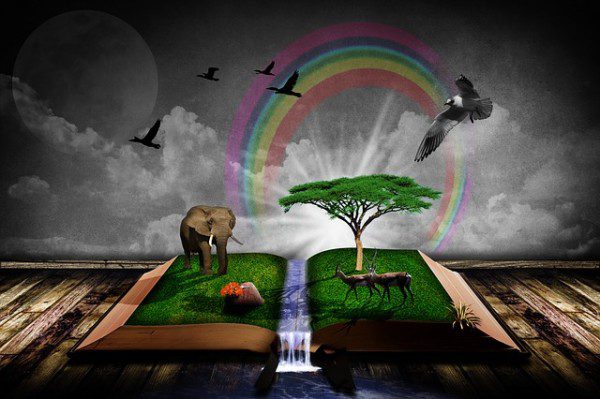Here is one example. . . .Creation, he says, is God’s speech. As the Bible teaches, God created the universe by His Word (e.g., Psalm 33:6). Rev. Hill quoted Luther’s Commentary on Genesis, in which Luther says that “God speaks reality.” When we speak, Luther said, in grammatical language. But God’s speech involves things coming into being. We are all words of God. The created word is spoken by the uncreated Word.
The connection of creation to language is evident in those beautiful but puzzling words of Psalm 19:
The heavens declare the glory of God,
and the sky above proclaims his handiwork.
2 Day to day pours out speech,
and night to night reveals knowledge.
3 There is no speech, nor are there words,
whose voice is not heard.
4 Their voice goes out through all the earth,
and their words to the end of the world.
So all creation is a kind of language. But to whom is God speaking in the language of creation? To us! Rev. Hill said that human beings “are meant to hear and to read this language.”
He tossed off this provocative statement and moved on to a related topic. But notice what we have here: a new way to think about learning! a theology of education!
We use the word “understand” to refer to grasping something intellectually. But we also use “understand” to mean comprehending someone’s language. The two are ultimately the same.
We “read” creation. This is what scientists are doing as they employ experimentation so as to “understand” the natural order. Actually, Sir Francis Bacon used this same metaphor in developing the scientific method. He spoke of “the Book of Nature.”
We can read a book for many different purposes–for knowledge, for pleasure, for relaxation, for stimulation, etc. Similarly, we can read “the Book of Nature” for the same reasons. We can attend closely to the creation so that we can learn about it, to enjoy its beauty, to reflect on its meaning, to rest in moments of self-forgetfulness, to have our interests stimulated, etc., etc., etc.
This is what scholarship is, “reading” books but also “reading” reality in its multiple facets. This is what education is, learning to “read” both human language and the world.
Postmodernists will say things like “everything is language” and that we are trapped in a “prison house of language.” But they assume language is merely cultural. Thus they despair of being able to truly know objective reality. Christians can recognize some of their insights, but because they believe that language ultimately is grounded in God and that objective reality is tied to God’s language, Christians have a basis (though partial for fallen human beings) for truth, for knowledge, and for education.
This is grounded ultimately in God’s Word, both written in human language and the Logos behind all creation who is God and who became flesh in Jesus Christ (John 1:1-18).
Illustration from Pixabay, CC0, Public Domain


















